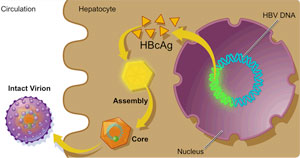Viral Antigens

A virus antigen is a toxin or other substance given off by a virus, which causes its host an immune response. Virus can infect all types of life forms, from animals and plants to bacteria and archaea. Virus particles consist of two or three parts: 1) the genetic material made from either DNA or RNA, the molecules carry genetic information. 2) a protein coat that protects these genes. 3) in some cases, an envelope of lipids that surrounds the protein coat when they are outside a cell. The shapes of viruses range from simple helical and icosahedral forms to more complex structures. The average virus is about one one-hundredth the size of the average bacterium.
Because virus is acellular, it can’t complete the growth alone. They must utilize the host cell to copy and assemble themselves. The life cycle of virus can be divided into six stages: attachment, intrusion, synthesis, shell and release. Firstly, the virus capsid protein recognize and bind the host cell surface’s specific receptor. Secondly, after the attachment, the virus enter the cell through membrane or swallow cell receptor mediated fusion. Then, complete the synthesis of viral genome replication, transcription and protein synthesis. At the end, the host cells release the copies of the virus.
BiologicsCorp(BIC) manufactures Hepatitis B surface antigen, preS1 and preS2. The products are only for laboratory research use, not intended for diagnostic or therapeutic purposes.
Ex Tax: $0.00
Ex Tax: $0.00

